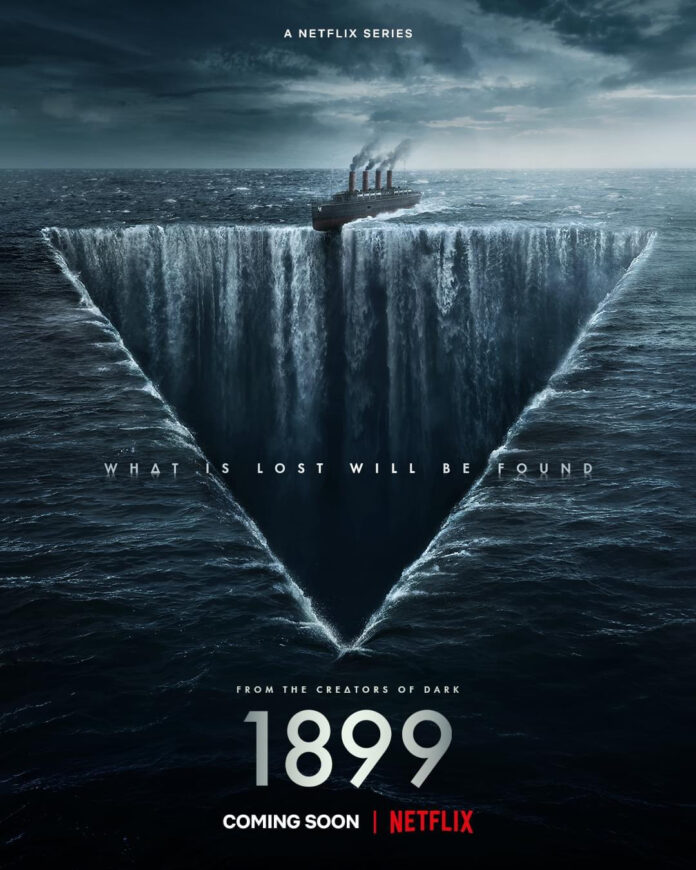Despite interest in multilingualism, Netflix’s newest international foray fails to make an impact
By ADHITHI ANHJALI — arts@theaggie.org
From the creators of “Dark,” a surprise German hit that arguably opened Netflix’s door to more international media, Jantje Friese and Baran bo Odar return with “1899.” Best described as opaque, dreary and guarded, the show’s most intriguing aspect — beyond the sci-fi time-weaving — is its international cast and multilingualism carried throughout.
Aboard the Kerberos, the show follows a large cast of immigrants seeking a new life in the United States. Twenty years prior to the famously tragic sinking of the Titanic, the Kerberos sets sail only four months after its sister ship, the Prometheus, has seemingly vanished from the face of the Earth. The echo of the lost ship haunts the cast and conversations in French, Spanish and German center around this topic. In the bellows of the ship, viewers hear Danish and Polish, while in first class we see a Geisha whisper in Cantonese, signaling the first of many false identities on board.
Focusing on the use of language, the story initially presents itself as a fundamentally new and exciting experiment — how many other shows have recently appeared on Netflix’s Trending Top Ten that incorporate more than two languages?
Combining the inability to effectively communicate with the unease of a mystery bolsters the thrills of secrecy and staves off resolution for the characters. Amidst the backdrop of the massive immigration from Europe into America at the turn of the 20th Century, the funneling of diverse languages onto one ship also represents the universal understanding of the American mythos of freedom from the past.
Consistent with the style of other dramas that feature large casts, each episode focuses primarily on one character’s life on the Kerberos and the sordid past that has led them there. Repeated ad nauseam by Spanish playboy Ángel, played by Miguel Bernardeau, everyone on the ship is wearing a mask, either forced upon them or taken up to protect themselves.
However, the force of language is a superficial one, despite its potential. The other aspects of the show are quite well done; the cinematography is eerily effective, using close-ups of fine details to urge the audience to question the tangible truths about the characters. The story itself, though at times trawling through its required screen time, is engaging enough that the truth unravels in a satisfying way, all the clues clicking into place and making a rewatch an enjoyable experience. But, in a sci-fi drama so concerned with the function of the brain and its ability to comprehend, even opening with Emily Dickenson’s “The Brain—is wider than the Sky—,” the opportunity to accentuate the power of language as equally a bridge and a wall for the mind was sorely missed.
Rather than exploring language as the construction of the human mind, by the time the assorted characters group up, barriers are overcome by individual translators. This undermines the challenges posed by such a unique set-up, where the inability to translate their reality into shared words would have supported its fundamental concern: whether or not there is a certain, discernable truth.
The producers of “1899” could have chosen to touch on more topics to give the show more depth. For example, linguistic theories of generativism, which argue for a universal grammar that would allow for easier language acquisition, and cognitivism, which claim that language is a conceptual system based on its use, could have played an interesting role.
It would be misleading to argue that “1899” is primarily about language. It is about grief and time, and the dangers of trapping yourself by trying to escape them. Ultimately, the show leaves viewers questioning the inclusion of the broad display of languages in the first place, given that the whole cast eventually yields to the language of Maura (Emily Beecham) as the protagonist.
Unfortunately, the distinctive decision to incorporate so many languages feels like a gimmick in its first season. Hopefully, if renewed for a second season, “1899” takes advantage of the boundaries it chooses to set.
Written by: Adhithi Anjali — arts@theaggie.org




